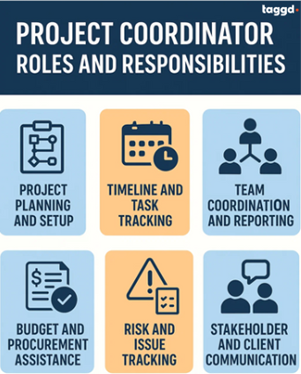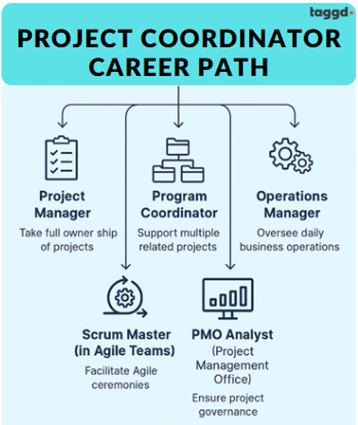Here are the key responsibilities and duties of a Project Coordinator in today’s dynamic work environment:
1. Project Planning and Setup
- Assist in defining project scope, goals, and deliverables.
- Help create detailed project plans, Gantt charts, and work breakdown structures (WBS).
- Identify resource needs and help allocate tasks.
Project Coordinators lay the foundation for successful execution by translating ideas into structured plans. Their involvement in project planning ensures alignment with business goals from the start.
2. Timeline and Task Tracking
- Monitor project schedules and update timelines.
- Coordinate task completion among different teams.
- Flag delays and bottlenecks to the project manager.
Tracking tasks and deadlines is crucial to avoid project overruns. Project coordinators implement GRPI Models under the Project Manager’s guidance and use tools like MS Project, Jira, or Trello to monitor progress in real-time and keep things on schedule.
3. Team Coordination
- Serve as the communication hub between cross-functional teams.
- Schedule and organize team meetings, stand-ups, and client reviews.
- Ensure team members have the resources and information they need.
Effective team coordination prevents miscommunication. Project Coordinators streamline collaboration between departments, vendors, and clients, ensuring everyone is aligned.
4. Documentation and Reporting
- Maintain comprehensive documentation: project charters, meeting minutes, reports.
- Prepare status updates and project dashboards for stakeholders.
- Ensure compliance with documentation standards.
From kickoff to closure, documentation is key to transparency. Coordinators manage all project records to support audits, reporting, and knowledge sharing.
5. Budget and Procurement Assistance
- Track project spending and help manage budgets.
- Process purchase orders, invoices, and vendor contracts.
- Alert the PM to budget risks or overspending.
Though not fully responsible for finances, Project Coordinators assist in budget tracking and procurement processes, helping ensure the project stays within financial limits.
6. Risk and Issue Tracking
- Maintain a log of project risks, assumptions, issues, and dependencies (RAID log).
- Coordinate with stakeholders to implement mitigation plans.
- Escalate critical issues to the project manager or leadership.
Coordinators play a proactive role in risk management. By keeping a detailed RAID log, they help prevent potential disruptions and maintain project stability.
7. Stakeholder and Client Communication
- Respond to queries and share regular updates with stakeholders.
- Ensure client requirements are clearly communicated to the team.
- Prepare presentations and reports for client meetings.
Coordinators bridge internal teams and external stakeholders. Their communication ensures clarity, builds trust, and keeps everyone aligned on expectations.
 />
/>







